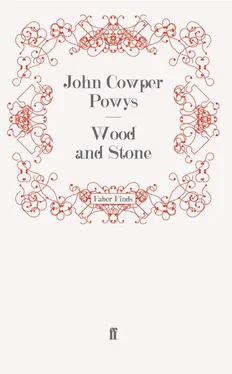Lacrima struck the ground nervously with her parasol. “What has happened?” she asked; “where has Gladys gone?”
James Andersen shrugged his shoulders, “I expect they have wandered into the shed,” he rejoined, “to look at my brother’s work there.”
She glanced nervously up and down the road; gave a quaint little sigh and made an expressive gesture with her hands as if disclaiming all responsibility for her cousin’s doings. Then, quite suddenly, she smiled at Andersen with a delicious childish smile that transfigured her face.
“Well, I am glad I am not left alone at any rate,” she said.
“I have a presentiment,” the stone-cutter answered, “that this is not the last time you will be thrown upon my poor company.”
The girl blushed, and smiled confidingly. Her manner was the manner of a child, who has at last found a safe protector. Then all of a sudden she became very grave. “I hope,” she said, “that you are one of the people who are kind to Mr. Quincunx. He is a great friend of mine.”
Never had the melancholy intimation, that one could not hope to hold anything but the second place in a woman’s heart, been more tenderly or more directly conveyed!
James Andersen bowed his head.
“Mr. Quincunx has always been very kind to me ,” he said, “and certainly, after what you say, I shall do all in my power to help him. But I can do very little. I believe Mrs. Seldom understands him better than anyone else.”
He had hardly finished speaking when the figures of two men made themselves visible opposite the back entrance of the vicarage. They were leisurely strolling down the road, and every now and then they would pause, as if the interest of their conversation was more than the interest of the way.
“Why! There is Mr. Quincunx,” cried the Italian; and she made an instinctive movement as if to put a little further space between herself and her companion. “Who is that person with him?” she added.
“It looks like George Wone,” answered the stone-cutter. “Yes, it is George; and he is talking as usual at the top of his voice. You’d suppose he wanted to be heard by all Nevilton.”
Lacrima hesitated and looked very embarrassed. She evidently did not know whether to advance in the direction of the newcomers or to remain where she was. Andersen came to her rescue.
“Perhaps,” said he, “it would be better if I went back and told Miss Romer you are waiting for her.” Lacrima gave him a quick glance of responsive gratitude.
“O, that would be really kind of you, Mr. Andersen,” she said.
The moment he had gone, however, she felt annoyed that she had let him go. It looked so odd, she thought, his leaving her so suddenly, directly Maurice came on the scene. Besides, what would Gladys say at this interruption of her pleasure? She would suppose she had done it out of pure spitefulness! The moments seemed very long to her as she waited at the little bridge, tracing indecipherable hieroglyphics in the dust with the end of her parasol. She kept her eyes steadily fixed on the tall retreating figure of the stone-cutter as he slouched with his long shambling stride towards the work-shop. The two men were not, however, really long in approaching. Maurice had seen her from the beginning, and his replies to Mr. Wone’s oratory had grown proportionally brief.
When they reached her, the girl shook hands with Maurice and bowed rather coldly to Mr. Wone. That gentleman was not however in the least quelled or suppressed. It was one of his most marked characteristics to have absolutely no consciousness of season or situation. When less clever people would have wished the earth to swallow them up, Mr. Wone remained imperviously self-satisfied. Having exchanged greetings, Lacrima hastened to explain that she was waiting at this spot till Miss Romer should rejoin her. “Luke Andersen is showing her his work,” she said, “and James has gone to tell her I am waiting.”
Mr. Wone became voluble at this. “It is a shame to keep a young lady like yourself waiting in the middle of the road.” He turned to Mr. Quincunx. “We must not say all we think, must we? but begging this young lady’s pardon, it is just like the family. No consideration! No consideration for anyone! It is the same with his treatment of the poor. I am talking of Mr. Romer, you know, Miss. I would say the same thing to his face. Why is it that hard-working clever fellows, like these Andersens for instance, should do all the labour, and he get all the profits? It isn’t fair. It’s unjust. It’s an insult to God’s beautiful earth, which is free to all. paused to take breath, and looked to Maurice for confirmation of his words.
“You are quite right, Wone; you are quite right,” muttered the recluse in his beard, furtively glancing at Lacrima.
Mr. Wone continued his discourse, making large and eloquent allusion to the general relations in England between employer and employed, and implying plainly enough his full knowledge that at least one of his hearers belonged to the latter class. His air, as he spoke, betrayed a certain disordered fanaticism, quite genuine and deeply felt, but queerly mingled with an indescribable element of complacent self-conceit. Lacrima, in spite of considerable sympathy with much that he said, felt that there was, in the man himself, something so slipshod, so limp, so vague, and so patently vulgar, that both her respect for his sincerity and her interest in his opinions were reduced to nothing. Not only was he narrow-minded and ignorant; but there was also about him, in spite of the aggressive violence of his expressions, an odd sort of deprecatory, apologetic air, as though he were perpetually endeavouring to cajole his audience, by tacit references to his deferential respect for them. There was indeed more than a little in him of the sleek unction of the nonconformist preacher; and one could well understand how he might combine, precisely as Mr. Lickwit suspected, the divergent functions of the politician and the evangelist.
“I tell you,” he was saying, “the country will not long put up with this sort of thing. There is a movement, a tendency, a volcanic upheaval, a stirring of waters, which these plutocrats do not realize. There is a surging up from the depths of — of —” He paused for a word.
“Of mud,” murmured Mr. Quincunx.
“—Of righteous revolt against these atrocious inequalities! The working people are asleep no longer. They’re roused. The movement’s begun. The thunder’s gathering on the horizon. The armies of the exploited are feeling the impulse of their own strength, of that noble, that splendid anger, which, when it is conceived, will bring forth — will bring forth—”
“Damnation,” murmured Mr. Quincunx.
The three figures as they stood, thus consorted, on the little stone bridge, made up a dramatic group. The sinking sun threw their shadows in long wavering lines upon the white road, distorting them to so grotesque a length that they nearly reached the open gates of the station.
Human shadows! What a queer half-mocking commentary they make upon the vanity of our passionate excitements, roused by anything, quieted by nothing, as the world moves round!
Lacrima, in her shadow, was not beautiful at all. She was an elongated wisp of darkness. The beard of Mr. Quincunx looked as if it belonged to a mammoth goat, and the neck of Mr. Wone seemed to support, not a human cranium at all, but a round, wagging mushroom.
The hushed fields on each side of the way began to assume that magical softness which renders them, at such an hour, insubstantial, unreal, remote, transformed. One felt as though the earth might indeed be worthy of better destinies than those that traced their fantastic trails up and down its peaceful surface. Something deeply withheld, seemed as though it only needed the coming of one god-like spirit to set it free forever, and, with it, all the troubled hearts of men. It was one of those moments which, whether the participants in them recognize them or not, at the actual time, are bound to recur, long afterwards, to their memory.
Читать дальше












